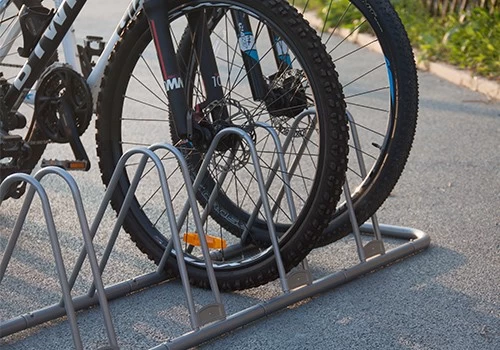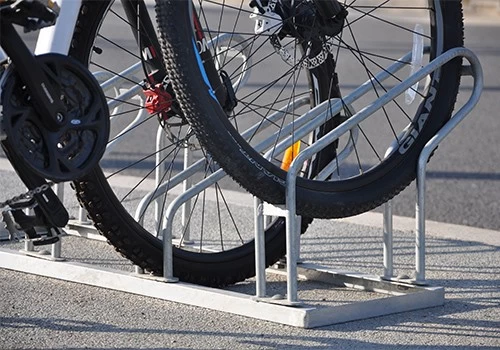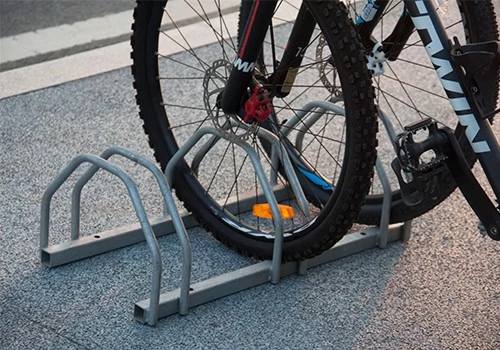Specifications
Model Number : PV-SC-001
Type: Bike parking and storage
Color:Yellow,Black,Green,Red,or Customized.
Style : both indoors and outside
Material : carbon steel
Loading: According to customer need
Size :195*23.2*75cm,200.55*23.2*75cm,or Customized.
Finish: hot-galvanized
Specifications
Model Number : PV-0081-01
Type: Bike parking and storage
Color:silver
Style : both indoors and outside
Material : carbon steel
Loading: According to customer need
Size :Height 1463mm, Depth 1114mm
Finish: hot-galvanized
Model Number : PV-0081-01
Type: Bike parking and storage
Color:Black
Style : both indoors and outside
Material : carbon steel
Loading: 2-10 bikes (According to customer need)
Size :Height 1463mm, Depth 1114mm
Finish: hot-galvanized
Model No.: PV-H1
Size: w605*D400*H330mm
Specification: Round tube:¢16*1.2mm
Finish: Power coated
Net Weight: 1.6 kgs
Packing size:6pcs/ctn
MOQ: 100pcs
Model Number : PV-0024-01
Material : carbon steel/stainless steel
Loading: according customer space size,we can design according the size
Size : W1977*D1130(depend on your parking space)*H2500mm
Finish: Powder coated ,hot-galvanized/electric polish
Packing size :2000*2000*2500mm(40 parking space )
Powder coated ,hot-galvanized/electric polish
Product number:PV-0046-01
Material:carbon steel
Specification:10.2*59*28CM or Customized.
MOQ:100PCS
Port:Shanghai
Trademark:PV
Model Number : PV-0081-01
Type: Outdoor Bike Parking Rack
Style : both indoors and outside
Material : carbon steel
Loading: 2-10 bikes (According to customer need)
Size :170.5*116*148CM
Finish: hot-galvanized
Model Number : PV-0055-01
Type: compact flat pack /slot
Color:black / silver /yellow/optional
Style :Outdoor/indoor
Material : carbon steel/ stainless steel
Capacity : park 6 bikes
Size : L1400*W1054*H840mm
Net weight :38KG
Finish: powder coating / hot galvanized /elctropolishing
Packing size :1490*860*160mm 1pcs/ctn
Product Name: Multi-Capacity Horizontal Two Tier Bike Parking Rack
Material: Carbon Steel
Finish: Powder coated
Post: 80mm * 80mm thickness: 3mm
Steel plate: thickness: 2mm
Dimension: 1325*1890*1830mm
Weight: 370 kg/set
Model: PV-0067-01
Material: stainless steel 304
Pipe: 50 mm* 2.5 mm
Size: 900*700 mm(L*W)
Surface treatment: polishing

In an era where sustainable transportation is gaining significant momentum, bicycles have emerged as a popular choice for short - distance commuting, fitness, and leisure. As the number of cyclists continues to grow, the need for well - designed and accessible bicycle parking racks becomes increasingly crucial. This blog post explores the importance of accessible bicycle parking racks, the design features that make them inclusive, and how they can enhance the overall cycling experience for all users.
The rise of cycling can be attributed to various factors, including environmental concerns, health benefits, and traffic congestion. In urban areas, more people are choosing to cycle to work, school, and for errands. This shift towards cycling has led to a surge in the demand for bicycle parking facilities. However, traditional bicycle parking options often fall short in terms of accessibility, leading to inconvenience and frustration for many cyclists.
1,Clear and Unobstructed Access Routes
One of the fundamental aspects of an accessible bicycle parking rack is the provision of clear and unobstructed access routes. According to the Americans with Disabilities Act (ADA) guidelines, pedestrian access routes should not be reduced in width by bicycle racks or other street furniture. Bicycle racks should be designed in a way that enforces the proper placement and orientation of bicycles, preventing them from obscuring these vital access paths. For example, racks with parking docks, such as the Varsity model, or ‘inverted u’ racks with orientation - correcting cross arms, like the Guardian, are effective in keeping bikes in an orderly manner, thus maintaining the continuous width of pedestrian access routes (which should be at least 4 feet wide as per ADA standards).
2,Safe and User - Friendly Design for All Abilities
Accessible bicycle parking racks need to accommodate users of all ages and abilities. This means considering the physical capabilities of different cyclists. For instance, some users may not have the strength to lift heavy bikes, especially electric bikes. Wall - mounted or multi - tier bike parking may be challenging for such individuals. Therefore, alternative options, such as low - level racks that require minimal lifting, should be available. Offset series vertical racks, which only require lifting bikes 1.5 feet (0.45 m) off the ground, are more accessible to a broader range of users.
Moreover, for visually - impaired pedestrians, additional safety measures need to be incorporated. Vertical racks adjacent to access routes should be equipped with a cane detection device surrounding the parking area. This helps prevent injuries by alerting visually - impaired individuals to the presence of the racks.
3,Adequate Spacing and Placement
Proper spacing between bicycle racks is essential for easy access. Despite the lack of specific ADA provisions regarding the exact spacing for bicycle racks, best practices suggest considering the dimensions of standard bicycles (usually around 1.8m in length and 0.5m in width) and allowing additional space for maneuvering. Dynamic CAD blocks, which can be downloaded from some manufacturers' websites, provide accurate guidelines for the appropriate spacing for all types of bikes and user access.
The placement of bicycle racks is also crucial. They should be located in areas that are easily visible, well - lit, and close to building entrances, public transportation stops, and other key destinations. This not only encourages more people to use bicycles but also makes it convenient for cyclists to park and retrieve their bikes.
4,Accommodating Different Types of Bikes
In today's diverse cycling landscape, there are various types of bikes, including cargo bikes, e - bikes, mobility trikes, racing bikes, and children's bikes. Accessible bicycle parking racks should be designed to accommodate all these different types. For example, wider parking bays are required for mobility tricycles, and small bike parking or mid - level rails should be provided for children's bikes. Some advanced rack designs even have adjustable features to fit different bike sizes and styles.

1,Inverted U - Racks
The inverted U - rack, also known as a hoop, staple, or Sheffield rack, is a highly functional and popular design. Its simplicity makes it accessible to a wide range of users. The addition of a cross - bar at the mid - point (around 375 - 500 mm) further enhances its usability, as it enables the locking of smaller (child's) bicycles as well as step - through frame cycles. For end stands, including a tapping rail can be helpful to support visually - impaired users.
2,Vertical Racks
Vertical racks are a space - saving option, but they need to be designed with accessibility in mind. As mentioned earlier, offset series vertical racks are more accessible as they require less lifting. Some vertical racks also come with features such as a gentle slope or a ramp - like structure at the base to assist in wheeling the bike onto the rack, making it easier for users with limited strength or mobility.
3,Modular Racks
Modular bicycle parking racks offer flexibility in design and installation. They can be configured in different ways to fit various spaces and user needs. For example, they can be arranged to create wider bays for larger bikes or grouped together to form a more extensive parking area. Modular racks can also be easily adjusted or expanded as the demand for bicycle parking changes.
4,Smart and Automated Racks
With the advancement of technology, smart and automated bicycle parking racks are becoming increasingly popular. These racks can be equipped with features such as sensors to detect the presence of a bike, automatic locking and unlocking mechanisms, and even mobile app integration. For users with disabilities or limited mobility, the convenience of being able to park and lock their bikes with minimal physical effort is a significant advantage. For instance, some smart racks allow users to operate the locking mechanism using a smartphone, eliminating the need to bend down or struggle with a traditional lock.
1,Encouraging Cycling for All
By providing accessible bicycle parking, more people, regardless of their physical abilities, age, or type of bike, are encouraged to cycle. This promotes a more inclusive and active lifestyle, as well as contributing to a reduction in traffic congestion and environmental pollution. When cyclists know that there are convenient and accessible parking options available, they are more likely to choose cycling as their mode of transportation.
2,Improving Urban Aesthetics and Functionality
Well - designed and accessible bicycle parking racks can enhance the overall look and functionality of urban spaces. Instead of bicycles being haphazardly parked, creating a messy and unappealing sight, organized and accessible parking racks make the area look cleaner and more orderly. They also help in optimizing the use of space, especially in crowded urban areas where every square foot matters.
3,Boosting Business and Community Appeal
Businesses and communities that invest in accessible bicycle parking racks are sending a positive message. They are showing that they are inclusive, environmentally conscious, and supportive of active transportation. This can attract more customers, employees, and residents. For example, a shopping center with accessible bike parking may draw in more cyclists, who are likely to spend money at the stores. Similarly, a community with excellent bike - friendly infrastructure, including accessible parking racks, is more appealing to families, young professionals, and those who value a healthy lifestyle.

1,The 10th & Yamhill SmartPark Garage in Portland
The 10th & Yamhill SmartPark Garage in Portland offers a great example of accessible bicycle parking. It has 32 bicycle racks, with 2 specifically designed to be ADA - accessible. Each rack is 6' 8" long, and there is a 10' 7" gap between racks, providing ample space for users to park and maneuver. The garage also has a bench for changing shoes, and it is open 24/7. This kind of well - thought - out design not only caters to the needs of cyclists but also sets a high standard for accessible bicycle parking in urban areas.
2,Community - Led Initiatives in Local Neighborhoods
In many local neighborhoods, community - led initiatives have been successful in implementing accessible bicycle parking. For example, in some residential areas, community groups have worked with local authorities to install bike racks in parks, near community centers, and outside schools. These racks are often designed to be accessible, with features such as low - level access points and clear signage. As a result, more residents, including children, the elderly, and those with disabilities, are able to use their bicycles for local trips, leading to a more vibrant and connected community.
Accessible bicycle parking racks are an essential component of a bike - friendly infrastructure. By incorporating design features that cater to all users, including those with disabilities, different ages, and various types of bikes, we can create a more inclusive cycling environment. The benefits of accessible bicycle parking racks extend beyond just providing a place to park a bike; they contribute to a healthier, more sustainable, and more appealing urban landscape. As the demand for cycling continues to grow, it is crucial for bicycle parking rack manufacturers, urban planners, and communities to prioritize accessibility in the design and implementation of bicycle parking facilities. Whether it's through the use of innovative rack designs, proper spacing and placement, or the integration of technology, accessible bicycle parking racks have the potential to transform the way we think about cycling and urban mobility.